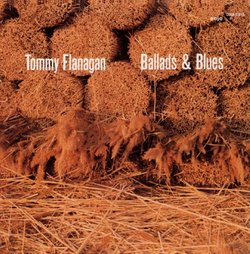| All Artists: Tommy Flanagan Title: Ballads & Blues Members Wishing: 1 Total Copies: 0 Label: Columbia Japan Release Date: 5/20/2009 Album Type: Import, Original recording remastered Genres: Jazz, Pop Style: Bebop Number of Discs: 1 SwapaCD Credits: 1 |
Search - Tommy Flanagan :: Ballads & Blues
 | Tommy Flanagan Ballads & Blues Genres: Jazz, Pop
|
Larger Image |
CD Details |
CD ReviewsSecond to none. Samuel Chell | Kenosha,, WI United States | 07/13/2010 (5 out of 5 stars) "There are half a dozen editions of this session presently available, the most recent a Japanese import costing around fifty. But the more reasonably priced versions should do you fine, since the source tapes are pristine if not exemplary in picking up the delicacies, nuances, subtleties and complexities of Tommy Flanagan's highly individual sound. His roots are unmistakably in the Bud Powell school of jazz piano--one of the reasons he's frequently lumped in with a triumvirate of Powell proteges who all happened to be from the Detroit area: Tommy, Barry Harris, and Hank Jones.
Without going into an analysis of each of the three--challenging because of the similarity of their ideas, melodic tradition, roots and even piano technique--it should go without saying that each epitomizes the best of the mainstream "blowing" piano tradition following Charlie Parker and Bud Powell. Each is renowned for his taste, his sensitivity, his impeccable phrasing and, perhaps above all, his touch. It's been reported that Sonny Stitt's favorite accompanist (among pianists, that is--when it came to the B3, Don Patterson was his man) was Barry Harris, though he can be heard on a number of recordings beginning in the '50s and carrying into the '70s with Hank Jones as his accompanist (and on a few occasions, the pianist sought after by every vocalist from Sarah Vaughan to Nancy Wilson: Jimmy Jones). The relative absence of Flanagan from Stitt's oeuvre is regrettable, since together there's little question about where a listener could always go to be assured of the sweetest music this side of heaven. Flanagan's piano lines sparkle, flow, and "breathe" to a degree not present in any of the aforementioned pianists. Among all of the "single-note," "blowing" pianists, he's the most identifiable because of his inimitable touch, or "sound." Compare, say, the recording of "Star Eyes" (a judicious choice on Bird's part as one of the most gorgeous tunes in the repertory of the American Songbook) as played by Barry Harris ("At the Jazz Workshop") and Flanagan on the present session. Granted, Harris' performance isn't earthbound for a moment: it flows with a sense of purposeful intent if not perfection, thanks in great part to the evenness of the touch. In other words, with Harris it's only upon second listening that the attentive, critical ear becomes aware of no small number of missed notes: it's the consistency of his touch and time that makes such slips irrelevant and scarcely noticeable. With Flanagan, on the other hand, everything is perfectly in place regardless of how many times you his solo--the deliberative and centered articulation of each individual note; the breathing, living quality of his phrases, which literally swell with expressive emotion; and, finally, his ability to take chances and come up with original "ideas" even within the continuous flow of the time stream (in Harris' solo, the flow remains uninterrupted, but one chorus tends to merge with another, with little to no distinction among them). Even without a drummer, Flanagan establishes a pattern at once metrical and symmetrical, luring the listener into joining him in his seductive, effortless, utterly natural "circular" dance. His playing provokes a physical response even more irresistible than that of his two contemporaries, yet at the same time he commands the listener's attention to the "action"--the surprises, variations, repetitions, tensions and releases--within the uninterrupted flow. Listening to Tommy is like getting double interest on your investment of time. It's a ride of unremitting pleasure combined with the discovery of unexpected, inspiring sights from beginning to end." |

 Track Listings (7) - Disc #1
Track Listings (7) - Disc #1